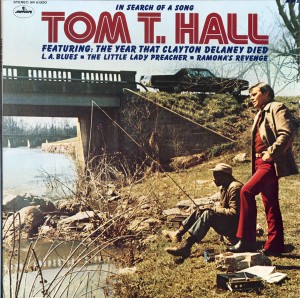Last time on World Records, we discussed Dolly Parton’s Coat of Many Colors, an album of paradoxes. We’re doing something similar for the next edition of this series, and much like before, those paradoxes feel mostly self-contained. But if there’s an album that reshaped what country music songwriting could sound like, it’s this one. Truth be told, while I’ve liked every album discussed thus far, this is the first true 10/10 classic release for me, and I can’t wait to discuss it. Onward!

As I sit here trying to think of the most grandiose statement to describe Tom T. Hall’s importance as an artist and to country music in general, it occurs to me that I’m overcomplicating things and that Hall would probably reject the praise anyway. This was, after all, the same artist who would stick a tennis shoe on top of his head whenever he tried to write a song, to remind himself that he was a regular person, rather than a hoity-toity “songwriter.” It’s more authentic to be a regular person over a perfect one, after all.
Indeed, Hall’s greatest strength was, well, his simplicity. Any one of his works has a uniquely casual feel, as if you’re chatting with a stranger who quickly becomes an old friend as he relays stories of life over a cup of coffee. He sings about life, which, for as harrowing of a journey as it provides, is mostly ordinary. It’s plainspoken and pleasant, for better and worse.
And yet, I can’t help it. Hall may have sang about regular people with the precision of a journalist chronicling every seemingly minute detail, but even he couldn’t help how those everyday experiences contained subtle moments of extraordinary insight. Therein lies the paradox with his work: Hall’s easygoing, conversational style carries a natural surface appeal that’s warm and inviting, but it’s sharply detailed material where the true meaning can pass one by if they’re sucked in to the atmosphere and don’t pay enough attention to the stories told.
It’s the sort of songwriting style one would likely immediately associate with country music, yet it’s still uniquely Hall’s alone. We’re familiar with songwriting tropes in country music: the brokenhearted fools wasting away in smoke-filled bars, the affinity for mama, trucks, trains, and prisons, and the odes to rural pride – just to name a few. They provide a bedrock that artists expand from to craft their own unique take on something familiar, but with Hall, they didn’t need to be artificially interweaved within; they were just stories of life, plain and simple.
Fittingly enough, that distanced storytelling perspective is enough to show how Hall rose up through Nashville’s ranks, observing from afar and letting others have the spotlight with his words. Jeannie C. Riley scored a huge country and pop hit with his “Harper Valley P.T.A.,” in 1968, a song filled with storytelling wit and unflinching honesty.
Of course, the success of that song, as well as Hall’s own material released as a solo act, took a mental toll on him. He began to feel the pressure, and for awhile indulged in it, proving he could always top his latest success. As he says in his autobiography, The Storyteller’s Nashville, other writers would go around Nashville saying, “Don’t take Tom T. Hall any songs. That sum-bitch writes five or six songs a day himself.” Hall burned himself out trying to prove it, and his initial fears of being a performer eventually came to haunt him.
So, the remedy? Why, drive around Kentucky and look for song ideas, of course. And talk to people to find them, at that. Hall’s friend and fellow songwriter Bill Littleton loved the idea and agreed to film the entire event, and all Hall would take would be a couple bottles of good whiskey and his guitar. The results formed his fifth album, In Search of a Song, a landmark release that perfectly encapsulates the Tom T. Hall experience.
And indeed, I’ve always considered In Search of a Song to be an excellent collection of simple stories that captures real, everyday people – more than just mere characters – with an empathy that suggests the storyteller understands them, perhaps too well. But it’s in going back to it that the deeper nuggets of insight reveal themselves to me. Despite being an album about people, there’s an inherent loneliness that underscores this project. At the very least, a yearning for authentic connection (and, in some cases, reconnection) that feels even more timely today than it did in 1971, even at its most humorous. After all, an album about life itself should mirror the reality of it – a mixture, if you will, where the harder moments of strife make the happier, tender moments all the more worth celebrating.
So, whether it’s the hog farmer hellbent on making a fast recovery so he can get back to business – because the neighbors just don’t look out for each other anymore – on “Who’s Gonna Feed Them Hogs,” the hapless fool searching desperately for love on “Tulsa Telephone Book,” the other hapless fool who loses out on love on “The Little Lady Preacher,” the outsider looking in on “L.A. Blues,” someone who misunderstands the meaning of a generational divide on “Kentucky, February 27, 1971,” or the mentally impaired titular character in “Ramona’s Revenge” who has to turn tragedy in her favor, these are people looking to be understood. It’s a problem that’s only been further amplified in the modern age by mass-produced popular culture and busy, cluttered lives robbing us of the ability to better appreciate the simplest things – never alone and always connected, but still always lonely.
Indeed, it’s why despite me appreciating the balance in levity this album provides through those aforementioned tracks, it’s the moments of truly sad isolation that gut me. I’ve written before about the tribute to a friend in “The Year That Clayton Delaney Died,” someone who was a mentor to Hall in gaining perspective on life early on, but who to everyone else was likely the outcast who wasted away his life, where the implications of past mistakes haunt the song in the way he found religious salvation before death. Another example of misunderstanding that underscores the core of this project in seeing through to the real person behind the flaws, and one I will always love. Equally chilling is “It Sure Can Get Cold in Des Moines,” which depicts the lonely barrier a stranger in town just can’t seem to break through and may never will; a real shame. Or take “Second Handed Flowers,” where an old flame of Hall’s character is dying from a mobile accident, and knows even in her final moments that she was never the one Hall wanted – she wasn’t even the woman he intended to see that day with his flowers in hand.
Of course, this isn’t an album looking to cast judgment either way – its only goal is to paint the full, real picture. It’s why this excerpt from “Kentucky, February 27, 1971,” a song in which an older man laments to Hall the disappearance of simple living, sticks with me: “You know, son, people used to tell their kids / Now I don’t want you to have to work the way I did / They don’t and some will tell you that it’s a shame / But you have to think before you place the blame.” And it’s juxtaposed with the equally haunting “A Million Miles To The City,” where childhood daydreams of city life and the great unknown life has to offer both underscore that reasoning.
Again, that’s the deeper poignancy you may or may not have to dig for to truly appreciate these stories. Nothing is played for show. “Trip to Hyden” chronicles the site of a 1970 mining disaster that killed 39 people, told through the eyes of a traveler looking at the event with bewildered astonishment. And yet, I always get hung up on one of the first lines, where he talks about tossing and turning in bed subconsciously recalling some old sinful thing he’d done. It’s a detail that doesn’t service the actual story whatsoever, but it’s one I appreciate in breathing life into characters and reminding us that they’re real people we can not only relate to, but understand all too well. It’s as if these stories are playing out in real time and we’re there alongside Hall, regardless of whether he’s the main character or just a faraway observer like us.
It’s that extra care that also feeds into the instrumentation and production. Hall never much wavered from his typical acoustic-based country-folk bedrock, another simple but timeless trademark nicely devoid of trends that stands proudly on its own and doesn’t get in the way of the song. But it’s here where I appreciate the subtleties that add something more to the mix. The crying trumpet caught between a proud salute and somber goodbye on “The Year That Clayton Delaney Died” never fails to stop me for a moment, nor does the plucky slow march of “It Sure Can Get Cold in Des Moines.” Though it’s that drawn-out, wistful harmonica lead on “A Million Miles To The City” that truly marks the most sobering moment for me.
And yeah, even the lighter cuts excel in this department, from the saloon piano and harmonica mimicking the titular animal on “Who’s Gonna Feed Them Hogs,” to the fittingly lively gospel swell of “The Little Lady Preacher,” all the way down to the funky, playful gallop of “L.A. Blues.” It’s cohesive, but there’s that unique touch added to every track that makes everything stand on its own – a storybook of individual chapters that make for one hell of a book of life, but also show why they’re all essential in capturing its ethos. I suppose it would be disingenuous to call an album about life flawless, but for me it’s one where even if I could find any, they’d still feel essential, because that’s how life rolls on from day to day and moment to moment. And in searching for a song, Hall crafted a masterpiece – one that’s always worth sitting back down to catch up with and enjoy.
Join me next time, where we’ll turn away from the personal narratives of these last few editions and focus on the bigger country music picture, with Waylon Jennings and Honky Tonk Heroes.


I must admit that, although I know many of his hits, I don’t think I’ve ever listened to a full Tom T. Hall album until listening to this one. As expected, it’s really good!
LikeLiked by 1 person
Unfortunately, nearly all of his albums are out of print, so it’s at least good that this got preserved!
LikeLike
Oh, I didn’t realize that – I guess that happens with a lot of the older artists/albums.
LikeLike